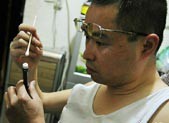
Zhou Xu, head of Nanjing Securities Co's strategy department, said the financial stocks were hurt especially because the seven-day repurchase rate, a measure of interbank funding availability, jumped to the highest level, 10.77 percent, since 2003, according to figures released by the National Interbank Funding Center.
"China's stocks can't take a turn for the better because of the increase in the money-market rate, especially the repurchase rate," said Zhou.
"The repurchase rate increase to 10.77 percent, almost double the same period last year, illustrates the nervousness over a lack of money in the market."
Various rumors have been swirling around the market to explain the sudden drain in credit, but none has been officially verified.
Zhou said the current signs suggest the People's Bank of China is unwilling to intervene in the market, adding that as a result domestic stocks are unlikely to see any significant recovery "at least for a while".
The flash HSBC Purchasing Managers' Index fell to 48.3 in June from 49.2 in May.
"The below-50 mark reflects a lingering slowdown across Chinese industry, especially in medium-sized and small enterprises, led by a gloomy export outlook," said Yuan Jun, an analyst at Ai Jian Securities Co Ltd.
"It is a cause of deep concern among investors in the Chinese stock markets, and those in the Asia-Pacific region as well."
Yuan suggested any rebound in the market index would be unlikely before October, because it would require time for the government to reshape its policies and for the policies to begin yielding their expected results.

















 A hemophiliac and his 'treasures'
A hemophiliac and his 'treasures'


![]()
